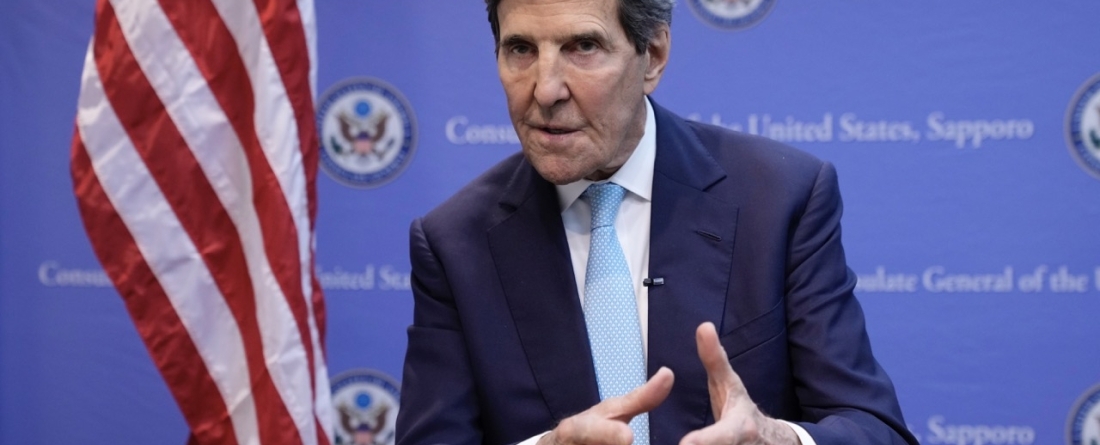
Ten years ago, more than a year before the Paris Agreement became a reality, two Americans were critical in helping the U.S. pave the way for a historic global climate deal. John Podesta, then-White House Counselor, recognized that a commitment from the US to cut its emissions by 2025 could spark global action. John Kerry, then Secretary of State, a tireless and tenacious negotiator, was committed to work with and encourage other countries to take necessary steps to keep within reach the goal of limiting warming to 1.5 degrees Celsius.
While working with Kerry as a senior adviser, I witnessed his absolute commitment to mobilizing action globally. He led the world in dramatically accelerating commitment and action on reducing methane emissions, the single most effective means to limit near-term warming.
Ten years ago, more than a year before the Paris Agreement became a reality, two Americans were critical in helping the U.S. pave the way for a historic global climate deal. John Podesta, then-White House Counselor, recognized that a commitment from the US to cut its emissions by 2025 could spark global action. John Kerry, then Secretary of State, a tireless and tenacious negotiator, was committed to work with and encourage other countries to take necessary steps to keep within reach the goal of limiting warming to 1.5 degrees Celsius.
While working with Kerry as a senior adviser, I witnessed his absolute commitment to mobilizing action globally. He led the world in dramatically accelerating commitment and action on reducing methane emissions, the single most effective means to limit near-term warming.
Late last year, when U.S.-China relations were at an historic low, Kerry secured an agreement with China to accelerate renewable energy deployment and reduce power sector and methane emissions. And at COP28 in Dubai, he led the charge for a global commitment to transition away from fossil fuels, triple renewable energy capacity globally, and double the pace of energy efficiency improvements.
Now, as Podesta prepares to take on a new role as senior adviser to the president for international climate policy, America is once again a leader on climate. The world has reached a clean energy tipping point, and global momentum toward action continues to build.
This renewed leadership and momentum would not have been possible without real action here at home. Building off a massive domestic policy push led by President Biden and supported by Congress through the Inflation Reduction Act and the Bipartisan Infrastructure Law, the U.S. is working to reach net-zero emissions by 2050 by making historic investments in electric vehicles, renewable energy, and other low-carbon technologies.
At the White House, John Podesta has been critical to ensuring that these historical clean energy investments continue to grow and benefits reach all Americans.
With a presidential election rapidly approaching, it will be critical for Podesta to show the global community sustained climate action at home. But global success will require his international leadership in three key areas: engaging with the world’s largest emitter, China, increasing global ambition, and partnering with local governments and business.
First, the U.S. must continue on the path blazed by Kerry, of clear-eyed and careful engagement with China to support enhanced action, with a heavy dose of clean energy competition. The U.S. and China are the world’s two largest economies and greenhouse gas emitters, but both countries are retooling their economies rapidly toward the jobs and technologies of the future.
While it is undoubtedly true that we will remain in competition in many technological areas — such as batteries and electric vehicles — continued positive engagement will inspire the rest of the world to do more, faster. Kerry, along with his Chinese counterpart Xie Zhenhua, managed to keep our countries’ joint focus on the critical shared issue of solving the climate challenge despite increasing geopolitical tensions between our countries. With Zhenhua’s impending retirement, the U.S. and China must continue to advance knowledge and action in renewable energy deployment, power sector management, methane reduction, and setting overall pathways that demonstrate best practices for the rest of the world.
Second, Podesta can build on existing successes to enhance global ambition over the next year. COP28 underscored that the world remains off track to reach our climate goals. All countries have been called upon to evaluate actions they can take domestically to accelerate their transitions toward cleaner economies, and will soon report their next round of targets for 2035. This will include vigorous action not only for energy and carbon emissions, but also other greenhouse gases like methane. The U.S. is a critical leader in this process, both in setting an example at home and encouraging others to do more through the international process. Our work in the next year to deliver a strong 2035 goal and support other countries’ actions will be the foundation for global success.
Finally, national governments cannot do this work alone. The U.S. needs to support and integrate the work of cities, states, tribal governments and businesses into our overall national and international strategy. The U.S. has been a pioneer in delivering an all-of-society climate strategy that supports and enhances leadership from mayors, governors, and more. Building on this success, the U.S. should continue to enhance its assistance, investment, and partnership to subnational actors, while encouraging other countries to take an all-of-society approach to cutting emissions.
John Kerry’s leadership supported transformative climate strategies that can get the planet on track toward global climate goals while delivering vibrant economies, improved health for our people, and good jobs for the 21st century. As November approaches and our international partners question American climate leadership, John Podesta can take tangible steps to support our shared global goals and tackle the growing climate challenge.
Nathan Hultman is the founding director of the Center for Global Sustainability at the University of Maryland. He served as a senior adviser to Secretary of State John Kerry and as deputy associate director for Energy and Climate Change at the White House Council on Environmental Quality.
